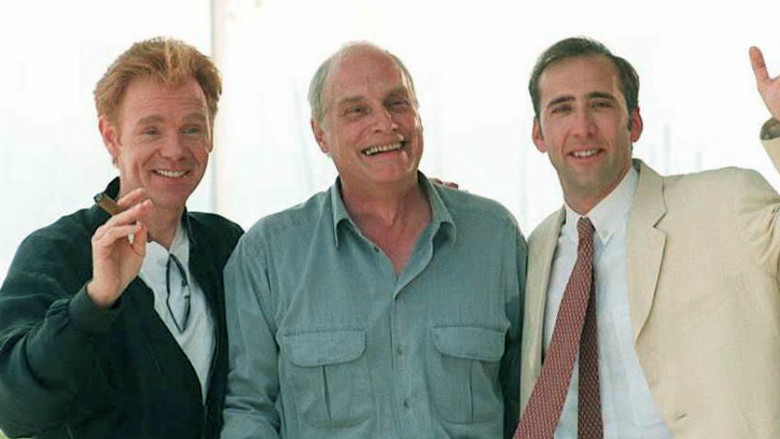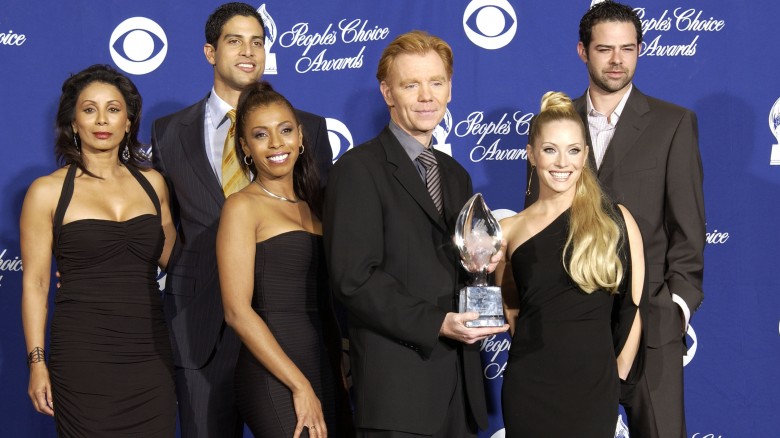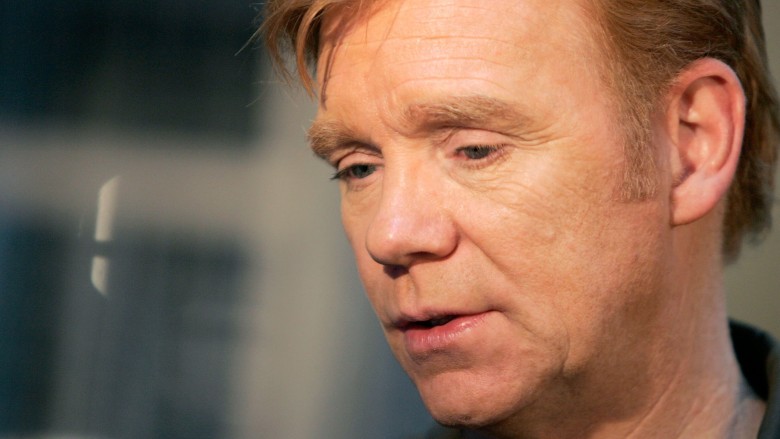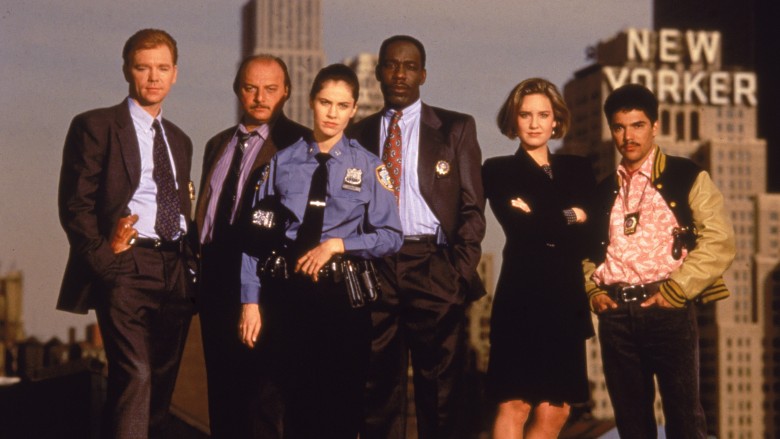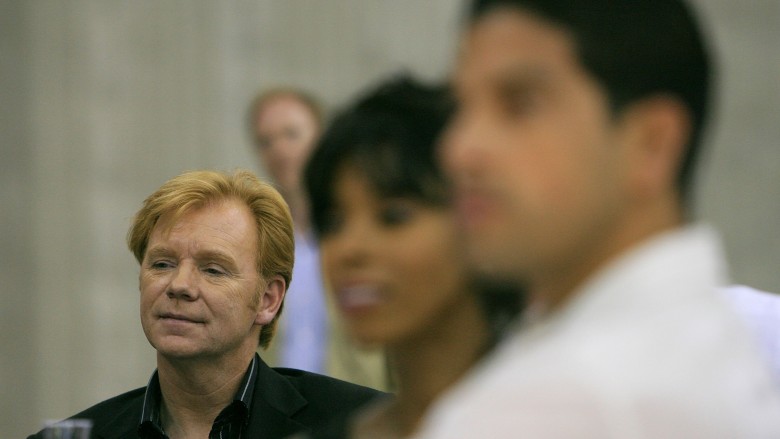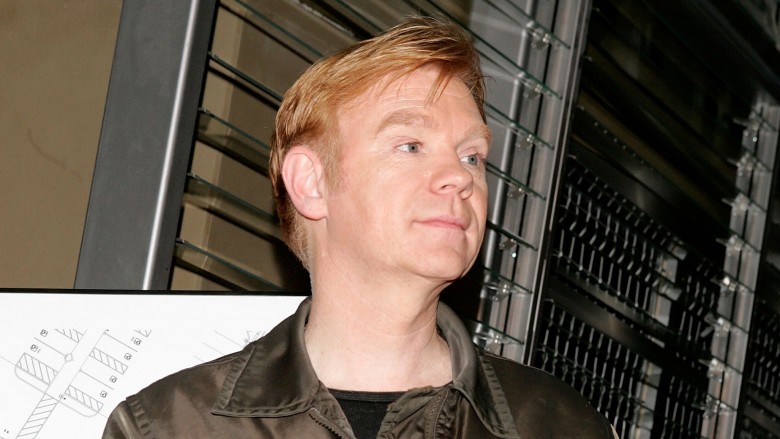The Real Reason We Don't Hear From David Caruso Anymore
For a decade, David Caruso was one of the biggest stars on TV thanks to his starring role as Horatio Cane on CSI: Miami. His episode-opening bit of fiddling with his sunglasses while making a quip, leading into the show's propulsive theme song by the Who, became a signature bit even for people who'd never seen the show. But CSI left the airwaves in 2012—an eternity in entertainment years. What's Caruso been up to ever since, and why haven't we seen him on TV or movie screens lately?
His post-NYPD Blue movie career was not much to write home about
After just one season (1993-94) on the critically acclaimed police drama NYPD Blue—for which he earned an Emmy nomination for Outstanding Lead Actor in a Drama Series—Caruso shocked the TV world by quitting the show to pursue a film career. In 1995, he starred in his first two movies, Kiss of Death and Jade; the latter was a massive box office bomb, raking in around $14 million, and Jade fared worse, grossing a mere $9 million.
Caruso's big risk didn't pay off right away, but within a couple of years, he started getting acting work again, appearing in Proof of Life and Session 9. While he only had supporting roles in those projects, they suffered similar fates, with the former making $32 million and the latter a not-so-whopping $378,000. As far as Hollywood bookkeepers are concerned, David Caruso does not put butts in seats.
His TV successes weren't because he was the star of the show
Since 1993, Caruso has starred on three network TV dramas: NYPD Blue, Michael Hayes, and CSI: Miami. NYPD Blue became a hit right out of the gate not because of the pull of Caruso, a relative unknown at the time, but because it was helmed by mega-producer Steven Bochco, who'd made classic shows like Hill Street Blues and L.A. Law. (Also helping: The show got a lot of buzz because it featured swearing and partial nudity.) Michael Hayes, a star vehicle for Caruso, aired to low ratings during the 1997-98 season. His big return to TV came in 2002 with CSI: Miami, which was an offshoot of the massively successful original CSI series. Essentially, Caruso has been along for the ride on some big shows, but he wasn't really the driver.
He's really expensive
CSI: Miami was both a massive ratings hit and a long-running show. That means that as the series went along, Caruso earned more and more money. Toward the end of its 10-season run, he was reportedly pulling in $375,000 per episode, which made him the third-highest paid dramatic actor on television.
Being in that upper echelon means any new project that comes along would need to make it worth Caruso's while, financially speaking. To get Caruso to sign on for a new project would be seriously costly—and then the network would have to spend millions more to promote the show. But today's TV landscape isn't what it was at CSI: Miami's peak; network series command ever-smaller audiences as viewers migrate to the growing number of streaming services and cable channels. And as demonstrated more than once earlier in his career, Caruso's involvement doesn't guarantee a show's success.
He may suffer from typecasting
Being a successful actor is obviously a blessing, but it can also be a curse. Those who play one role for a very long time became so deeply associated with that part that audiences (and producers) have a hard time separating the actor from the character, and tend to call on them for similar roles. On all three of Caruso's TV shows—NYPD Blue, Michael Hayes, and CSI: Miami—his character has been involved with law enforcement. It's possible Caruso has just had a hard time breaking out of cop mold.
He's reportedly difficult to work with
Nobody wants to work with a prima donna, and Caruso has earned a reputation as an actor who's less than easygoing. When he left NYPD Blue after one season, it was seemingly something of a relief to both producer Steven Bochco and creator David Milch. In his memoir, Bochco wrote that Caruso seemed miserable on set, and speculated that he acted that way on purpose, alleging every time he'd "call Caruso into my office for a conversation about his problems, he'd shut down like a sullen teenager." Bochco also described Caruso's behavior as "cancerous," accusing the actor of being "emotionally unavailable to everyone" and "volatile, moody, or sullen, depending on the day," adding, "Most people don't function well in a dysfunctional environment, but Caruso loved it because he was the source of all the discontent, and it empowered him."
As for Milch, the writer discussed the first season of NYPD Blue on IFC's Dinner for Five. Milch remembered Caruso getting scripts and making comments like "who writes this s***?"—directly to Milch, who was often the script's author. Milch says the stress of working with Caruso nearly killed him, recalling, "I'm on the set with him, and he's making me go through the scene, and I think, hmph. I'm having a heart attack. I'm having a f***ing heart attack, and I'm going to die arguing with this no-talent."
He seems to be retired
Perhaps some movie production company or major TV network has been hounding David Caruso to star in their show—after all, there are a lot of TV networks and streaming services out there right now, and they need marquee names. But if they're calling, Caruso isn't answering: for all intents and purposes, he retired after CSI: Miami was canceled in 2012. Since the show concluded, Caruso hasn't added a single acting or producing credit to his résumé, nor does he have any upcoming projects listed. Time will tell if he regains the itch to act after an extended period out of the spotlight, but for now, it seems that whether or not Hollywood's done with him, David Caruso's done with Hollywood.
He's a tech entrepreneur
Shortly before the explosion of online streaming media, Caruso helped fund an online video service in 2008 called Lexicon Digital Media. He was the company's first chairman and CEO, while Nils Lahr (who helped develop Microsoft Windows and the MPEG-4 video format ) was its CTO. Caruso was inspired to get into the potentially lucrative world of online video when he was doing promotional work for CSI: Miami in Japan, where only the first three seasons of the show had aired, while in the U.S., Season 7 was about to air. It struck him that it could be very financially successful if he could develop technology to make the show more instantly distributable. "If we could organize the world of content and shrink it, imagine the monetization on all the different variations of content that we could pursue," Caruso said. However, while Caruso accurately predicted the rise of online video services like Netflix, Hulu, and Amazon Prime, Lexicon Digital Media hasn't seemed to make any major moves since the announcement of its existence in 2008.
He's too busy fighting his property tax bill
In 1998, four years before he took on the role of Horatio Cane on CSI: Miami, Caruso bought a luxury condo in a Miami Beach high-rise called Il Villagio. And apparently every year since 2011, Caruso fights paying his property taxes on it. His formal appeals are heard by a committee called the Value Adjustment Board, which takes complaints about properties that may have been overvalued and thus overtaxed. Caruso's success rate in getting those taxes lowered has been mixed. For example, in 2011 and 2013 the board lowered them by a small amount, and in 2014 and 2015 his pleas were rejected.

